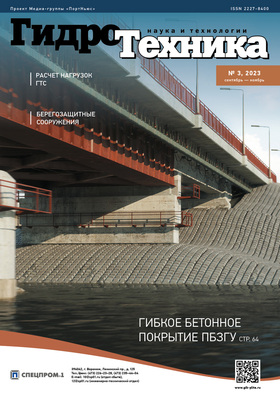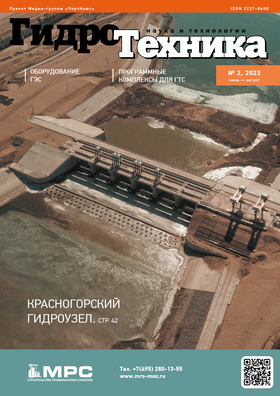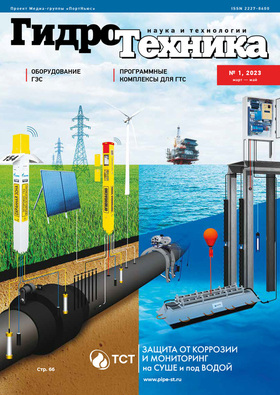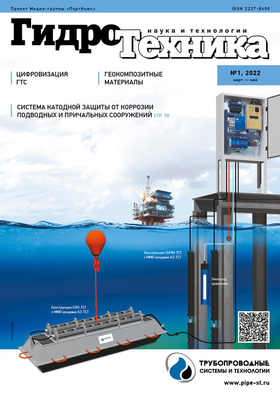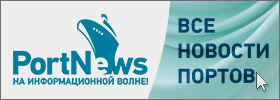About The Hydrotechnika
Background
The Hydrotechnika has been published since 2008. Registration certificate: PI No FS77-73982.
Until 2017, the founder of the journal was the Tandem Publishing House (media registration certificate: PI No. FS77-34599).
Since 2017 the founder and publisher of The Hydrotechnika journal is Information and Analytical Agency PortNews, which is the leading Russian media group providing coverage of waterborne transport, shipping, and shipbuilding sectors developments.
The journal is published four times a year. A4 paper size, 64-76 pages, full color edition.
The journal is distributed by subscription, primarily at industry events, at meetings of maritime sector associations and professional communities, or by direct mailing to federal and regional ministries and departments.
The journal is placed in the Scientific Electronic Library, has a digital object identifier (DOI), and is included in the Russian Science Citation Index (RSCI).
The Hydrotechnika editorial office address: Russia, 191119, St. Petersburg, Zvenigorodskaya St, 1, office #104.
The Hydrotechnika concept
The Hydrotechnika is a cross-industry journal whose mission is aimed at the interaction of scientists and practitioners in the field of hydraulic engineering, support and promotion of scientific discoveries, research results, developments; dissemination of effective experience and technologies in all areas of hydraulic engineering.
The journal publishes articles of scientific and practical importance in the following segments: hydraulic engineering construction including design, construction, regulations, operation of water engineering installations of various purposes; ensuring the safety of hydraulic engineering structures (HES); water resources and land reclamation; hydraulic earth-moving at water bodies; development of the continental shelf; protection of ground and structures; automation and digitalization of HES; environmental impact of hydrotechnical construction; water supply and sanitation; underwater engineering work; equipment and materials for HES. The editorial board organize discussions on topical issues of science and practice, the results of which are published in the journal.
The PortNews media group, as the founder and publisher of the journal, provides analytics and insights in the field of water transport, the development of the shelf and the Arctic, interacting with ministries and departments, major companies implementing the strategic tasks of the Russian Federation. The Hydrotechnika publishes analytical materials relevant for hydraulic engineering construction. The PortNews media group annually organizes and hosts the Hydraulic Engineering Structures and Dredging International Congress to discuss the challenges of the sector with a wide professional community, search for their solutions, promote effective developments in science and practice. The congress includes the Forum of Dredging Companies and the Scientific and Technical Conference Modern Solutions for Dredging Works. The results are also published in The Hydrotechnika.
The main sections of the journal:
- Hydraulic engineering structures (HES) of waterborne transport
- Offshore oil and gas HES
- Hydropower
- HES of industrial complexes
- Water resources
- Automation, digitalization of HES
- Building technologies and materials
Ethics of scientific publications
The editorial board of The Hydrotechnika relies on the ethical standards adopted in the scientific community, guided by the Declaration of the Association of Scientific Editors, international standards of editorial ethics, reflected in the recommendations of the Committee on the Ethics of Scientific Publications, and the legislation of the Russian Federation regarding copyright and the media.
Articles are published in the journal free of charge (with the exception of advertising articles).
Editorial staff ethics
- The editors evaluate materials submitted for publication objectively and impartially, regardless of ethnicity, gender, age, religion, political views of the author.
- The editors conscientiously work with the texts of articles, relying on the opinions of members of the editorial board, reviewers and independent experts, preventing the appearance of unscrupulous scientific publications containing plagiarism, falsification and fabrication of data.
- The editors guarantee the confidentiality of the received materials and reviews, even if the materials are not published. Any data obtained from submissions is available only to the participants in the publication process and cannot be transferred by them to third parties or used for their own purposes without the consent of the author.
- The editorial staff constructively accepts justified criticism of published materials, providing their authors with the opportunity to respond to criticism in the format of scientific disputes. The editors are ready to publish corrections, clarifications, refutations and apologies when necessary.
Editorial policy towards authors
- The author(s) guarantees that the work submitted for publication is original material, is published for the first time, is not a plagiarism, a paraphrase of a previously published article and has not been transferred for publication to other publications. If some fragments of the submission have been previously published, the author must refer to an earlier publication and justify the significant differences, novelty and significance of the new work.
- The author(s) is responsible for the content of the materials, the accuracy and correctness of the data contained in them.
- The author guarantees that he/she is the owner of the exclusive rights to the articles transferred to the journal.
- The author adopts a system for evaluating the submitted materials received by the editors: the relevance of the problem posed, scientific novelty, practical significance, reliability and reasoning of the results, the level of presentation of the material (logic, clarity, literacy of presentation, compliance with the requirements for the design of the material).
Ethics of peer review
- All materials received by the editorial office (except advertising and editorial) are reviewed by independent experts. The journal adopted one-sided blind peer review: the reviewer knows who the author is, but the author does not know who the reviewer is. Each material is submitted for review by two experts. The review period is one month. Reviews are kept in the editorial office for five years.
- Reviewing is based on the principle of scientific objectivity, on respect for the author and does not contain personal assessments. Comments, if any, are indicated in the review, aimed at improving the material submitted for publication. The reviewer must refuse to review the submission if there is a conflict of interest with the authors and / or organizations associated with the scientific MS.
- Reviewing is confidential, the reviewer has no right to disclose and use the materials of an unpublished manuscript in his own interests without the written consent of the author.
- Articles that have received a negative opinion are rejected, and a substantiated written refusal is sent to the author. If the author disagrees with the opinion of the reviewer, the manuscript is transferred to another independent expert. The issue of publishing materials that received exactly the opposite assessments of reviewers is discussed with the editorial staff, based on the results of the majority of opinions, the editors decide on publication.
Copyright and conflict of interest
- The rights and responsibilities of the author and the editors are fixed in the License Agreement concluded with the author.
- The author must notify the editors of the presence, if any, of a conflict of interest that may affect the evaluation of his/her manuscript.
- If there is financial support for the article, the author must indicate its sources in the submitted MS.
- Any participants in the publication process (editor, reviewers) declare their refusal to work with the submission in case of a conflict of interest with its author, which is not a reason for refusing to publish the author – the manuscript is transferred to another editor and reviewer.
Editorial Board
The editorial staff, the editor-in-chief work in conjunction with the editorial board, defining the concept of the journal as a whole, the priorities and content of each issue, resolving controversial issues related to the publication process and positioning of the journal in the scientific and professional community. The editorial council brings together leading scientists in various fields of hydraulic engineering as a science, as well as experienced practitioners who have merits and achievements in their fields of activity and contribute to the initiation of scientific research on issues relevant to practice.
Release schedule:
№ 1 March (release date: 03/10), submission deadline February 10
№ 2 June (06/10), deadline May 15
№ 3 September (09/10), deadline August 15
№ 4 December (12/10), deadline November 15
Distribution system
- Statutory copies of each issues of The Hydrotechnika are distributed to libraries through the Russian Book Chamber and the Russian State Library. The journal is also placed in the Scientific Electronic Library.
- Clients can subscribe to the journal both at the editorial office, and through the Russian Post and subscription agencies.
- Additional free distribution is carried out to the relevant ministries and departments, professional associations and scientific organizations cooperating with the editorial office.
- The Hydrotechnika is distributed at key cross-industry and maritime sector exhibitions, meetings, conferences and seminars.

